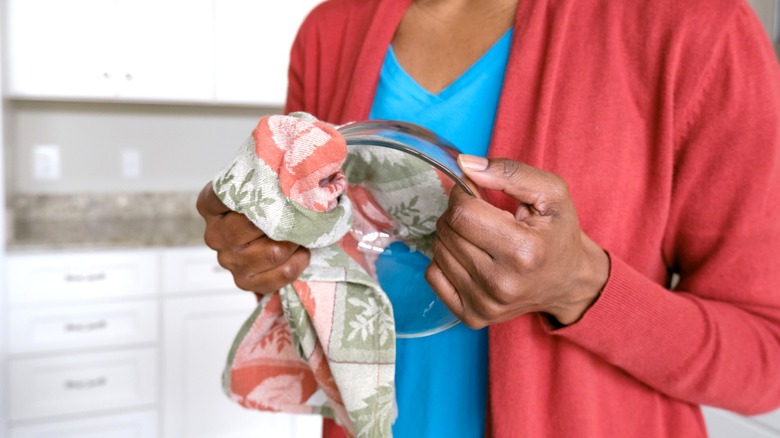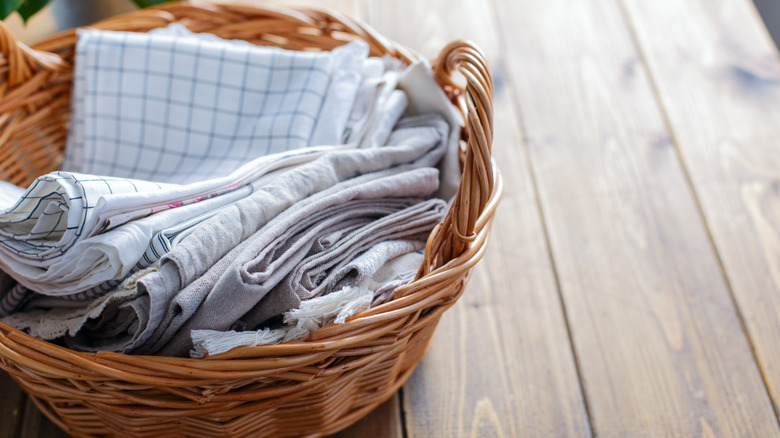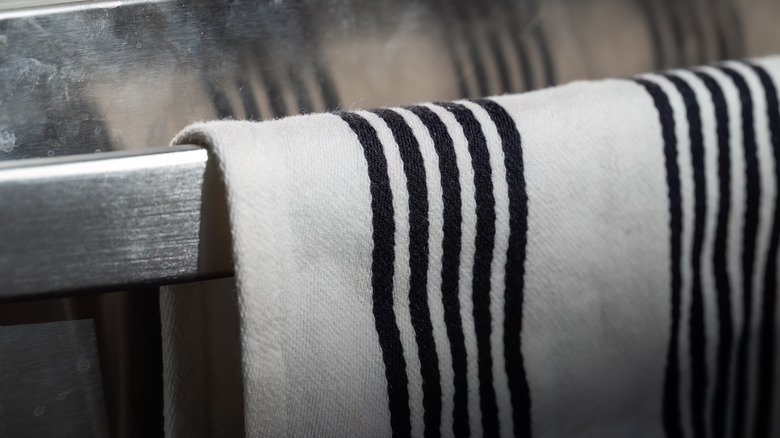The Best Dish Towels Are Made Out Of This Durable Material
When choosing a dish towel, it can seem like there's an overwhelming amount of information, with everyone having an opinion on details ranging from designs to how to fold them. Even Marie Kondo has a preferred way to store dish towels! Rest assured, at least the right material to use is pretty cut and dry. Linen is simply the best choice at the end of the day, and there are numerous reasons why.
Dish towels are meant for more than just drying dishes. Most people use them as an all-purpose cleaning cloth in the kitchen for their skin, spills, or messy pan handles. You can also briefly pick up hot items with them to keep your hands from burning. Linen does all of this well, thanks to its flax-based material. Flax is an eco-friendly choice that is simultaneously gentle and durable. Its cultivation has a lower impact on the environment and produces less waste than many other materials. The strong fabric is hypoallergenic and easy on the skin, so whether you're using them to dry your hands, the dishes, or to clean up a mess, linen dish towels always do the job comfortably and reliably.
Linen versus cotton dish towels
Your grandma might have told you that flour sack cotton towels are the absolute bees' knees. While they are wonderful and incredibly absorbent compared to other towels, they still don't stand up to the value of linen. For one thing, kitchen towels get really disgusting, especially those made of cotton. This is partially because they absorb water very well but do not dry out as quickly. This allows bacteria to grow and smells to develop. By contrast, linen wicks moisture and then dries out fairly fast. Linen also degrades more slowly, meaning the surface won't pill with constant use and cleaning. It won't stretch due to it being 30% stronger than cotton, so it's less likely to get ragged over time. The material also resists stains and heat, allowing the towels to add a classy look in the kitchen for longer.
As a final selling point, linen tends to have a lower physical profile than many other dish cloth, making storage a breeze. They also take up less space in the wash, meaning you don't have to do as many loads. Considering this, it's no wonder that many professional chefs swear by linen towels.
Linen isn't perfect
Just because linen is the superior material, it doesn't mean it's without drawbacks. Cotton is arguably more absorbent than linen, and it's less expensive to produce. Although linen can become quite soft and luxurious with washing, it may initially feel a little harsher against the skin when compared with terry cloth. This difference is negligible, though, when you weigh the benefits.
As with all kitchen towels, you should not use linen dish towels for heavily soiled and microbe-rich substances, like raw meat. Germs can manage to live on towels, even linen ones, for multiple days, meaning you could easily spread them around your kitchen and onto your body. You should also not use it to clean your sink for a similar reason. Even with linen's quick-drying composition, you'll need to frequently wash your towels, and as long as you do that, they should stand up to all manner of fruit and vegetable residue. So, if you need a dish towel the next time you cut an avocado or an orange, try to reach for a linen one.


